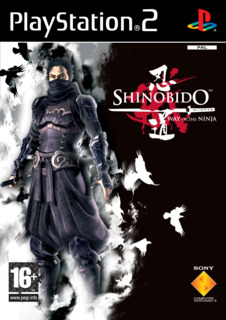With a little more work, it could've been the ultimate ninja game.
The story is interesting, but quite confusing in the end. It's pretty good in the beginning, though, you starting as an amnesiac ninja named Goh, the Crow, who wakes up in a river with no recollection of what happened or why is he there. He finds a strange glowing stone in a shed and, as he glances upon it, he regains part of his memory, the stone revealed to be part of his soul by a mysterious man via a letter (delivered by an arrow to the shed's wall). After the first, tutorial-esque mission, you go back to the shed, which becomes your hub for the remainder of the game. In the shed, you can read more letters and accept missions from one of the three feudal lords who are in war for Utakata (the game's region). It is your goal to find the rest of the pieces of your soul, and the feudal lords can help you find them, provided you help them in the first place.
That's one of the main attractions of Shinobido. You can accept whatever missions you want, but you have to keep in mind how the outcome of these missions will affect the trust each of the lords have on you. For instance, there are missions in which one of the lords will ask you to steal rice for their troops from some other lord. Being successful in the mission will award you with more trust from the requester but, if you're discovered in the mission, the lord from who you took the rice will lower his trust on you. Ultimately, you can favor one of the lords or even work for all three in secret, affecting directly the outcome of the game.
While on the shed you can manage your equipment, buy or sell items, and, later in the game, use alchemy to produce new items, such as positive effect items for yourself, or negative effects for your enemies. You can also save your game and go to your garden, a customizable area around the shed which is good for training purposes, but will also be the target from attacks of savages trying to steal your items. By customizing your garden with traps and whatnot, you can build more effective defenses against such attacks.
The game's controls are pretty responsive. Though geared for stealth, the game has a competent battle mode, with few but useful combos. Yet stealth is still essential, and the game doesn't falter on that. You can perform stealth kills on enemies whenever a flash appears on your characters head, and, though much easier done in unaware enemies, you can stun enemies mid-battle for a quick kill. The environments are incredibly interactive, giving you numerous ways to fool your enemies.
The graphics aren't incredible, but the physics engine is very good, with almost every object on-screen reacting to yours and your enemies' actions.
The sound isn't good, though, with a repetitive soundtrack and uninspired voice acting. The sound effects are as varied as they can be, but aren't noteworthy whatsoever. At least it has a Japanese voice option.
If the development team had spent more time in development and if the title had an increased budget, it might have become even bigger than Tenchu. It has enough innovations not to be considered a knock-off, yet the lack of polish this games suffers from are too much to go unnoticed. If you're into ninjas and are tired of the Tenchu series, this game is worth importing.

